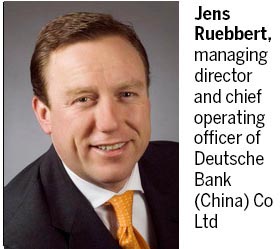Keeping pace with growing Chinese economy
Updated: 2012-09-06 10:26
(China Daily)
|
||||||||
Interview | Ed Zhang
Deutsche Bank sees future in capital market, yuan liberalization and advisory services
Deutsche Bank moved into its new branch building in Shanghai's Pudong in June, exactly 140 years after it opened its business in China (also in Shanghai) - the bank's first overseas branch just two years after it was founded.
But it was not planned that way, explains Jens Ruebbert, managing director and chief operating officer of Deutsche Bank (China) Co Ltd.
|
 A Deutsche Bank (China) Co Ltd branch in Shanghai. The bank hopes to establish more outlets in the country to help spread its services in western locations. [Photo/China Daily] |
Rather, it was a near-term move the bank just had to make, to keep pace with the continuous growth taking place in China.
Deutsche Bank (China), fully established in 2008, runs five branches in Beijing, Shanghai, Guangzhou, Tianjin and Chongqing, while its German holding company also runs key joint ventures in investment banking and commercial banking with Chinese partners.
Previously a corporate finance specialist based in various key centers around the world, including Hong Kong, Ruebbert is the manager of Deutsche Bank's locally incorporated bank and oversees all its infrastructure, risk management and support functions.
"It's a wide range of responsibility on an everyday basis," he said.
He describes his change in role as "an important step forward in my career".
He wanted to be in Shanghai, he says, because it's where "the excitement is, and all bankers want to be in the middle of economic growth".
In about three years, Ruebbert and his 700-strong staff have built an operation with one of the most impressive growth records of any foreign bank in China.
|
 |
However, to maintain that quality, Ruebbert says he has had to spend a lot of time and effort on recruitment, and staff development programs.
"Qualified staff," or "bankers and bank managers with 10 to 15 years of experience" are still very hard to come by, he notes, as banking in a market-economy environment is still relatively young in China.
For external appointments, Ruebbert says his strategy has mainly been to work with well-known, top-tier Chinese universities.
For internal staff development, he adds that every method possible is used to ensure the workforce retains its "most valuable asset".
Those methods include specialist training, sending staff on overseas assignments, and leadership programs jointly developed with the universities.
As well as the challenge of maintaining the quality of his staff, he says the other major task facing Deutsche Bank in China is keeping up with the changing regulatory environment, understandable for a still-young international banking sector.
As the Chinese government has been learning and trying to improve the regulatory environment, the pace of change is such that Ruebbert has had to remain "constantly alert and prudent in making the right decisions at the right time", he says.

 Relief reaches isolated village
Relief reaches isolated village
 Rainfall poses new threats to quake-hit region
Rainfall poses new threats to quake-hit region
 Funerals begin for Boston bombing victims
Funerals begin for Boston bombing victims
 Quake takeaway from China's Air Force
Quake takeaway from China's Air Force
 Obama celebrates young inventors at science fair
Obama celebrates young inventors at science fair
 Earth Day marked around the world
Earth Day marked around the world
 Volunteer team helping students find sense of normalcy
Volunteer team helping students find sense of normalcy
 Ethnic groups quick to join rescue efforts
Ethnic groups quick to join rescue efforts
Most Viewed
Editor's Picks

|

|

|

|

|

|
Today's Top News
Health new priority for quake zone
Xi meets US top military officer
Japan's boats driven out of Diaoyu
China mulls online shopping legislation
Bird flu death toll rises to 22
Putin appoints new ambassador to China
Japanese ships blocked from Diaoyu Islands
Inspired by Guan, more Chinese pick up golf
US Weekly

|

|






